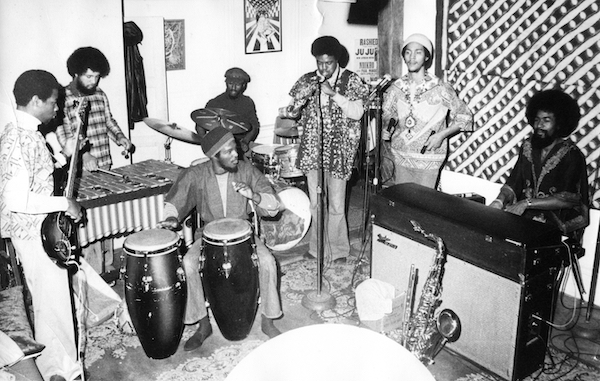Jan 13, 2026 2:09 PM
More Trump-Kennedy Center Cancellations
The fallout from the renaming of the John F. Kennedy Center for the Performing Arts to include President Donald…

Oneness Of Juju in the studio during the 1970s. A batch of the band’s recordings is being reissued as African Rhythms 1970-1982.
(Photo: Courtesy James "Plunky" Branch)James “Plunky” Branch met his future business partner and friend Jimmy Gray almost by chance.
In the early ’70s, Gray had a publication called Black Fire, which was a kind of catalog, featuring lists of the records being released by Black-owned independent labels like Strata-East, Tribe and Black Jazz. In the first issue, he ran a picture of Juju, the avant-jazz group headed by Branch. The saxophonist was furious and called up the band’s label, Strata-East, to demand legal action. But, as he writes in the liner notes for the new compilation Soul Love Now: The Black Fire Records Story 1975–1993, “The label said, ‘No, that’s Jimmy from D.C.! He is promoting for us there.’ Based in Richmond, Virginia, I was living in Jimmy’s catchment area; we fast became good friends and began doing everything together.”
That “everything” included forming Black Fire Records, a label that tapped into the flourishing jazz, funk and r&b scenes in D.C. and Virginia, and was infused with their Afrocentric, left-wing politics and spiritual bent. During its peak period—the same stretch found on Soul Love Now, which is set for release Aug. 14 on Strut—the imprint released work from the likes of future go-go stars Experience Unlimited, Sun Ra sideman Byard Lancaster and several of Branch’s projects, including the African-inspired Oneness Of Juju. While none of Black Fire’s releases sold in huge numbers, the records have become coveted by rare-groove collectors and DJs around the world.
Ahead of the release of Soul Love Now and African Rhythms 1970–1982, which collects tracks from some of Branch’s various projects, the saxophonist spoke to DownBeat about the compilations, as well as the spirit and sounds that made Black Fire a reality.
The following has been edited for length and clarity.
What inspired you and Gray to start Black Fire?
First and foremost, our experience with Strata-East, which was largely positive and educational. Jimmy had been the promotions person for Strata-East for the Mid-Atlantic during the Gil Scott-Heron thing. The idea of working with a cooperative of musicians and producers to create something that would be jointly owned and shared was a very positive experience. However, when Gil Scott-Heron’s album Winter In America came out, it had a song on it called “The Bottle,” which was, for all intents and purposes, a hit record. The way Strata-East was organized was that each artist produced their own manufacturing for the first 1,000 [or] 2,000 copies of an album, and if those sold out, the label would take over and replenish. But for a while, “The Bottle” was so hot that nobody had it except Jimmy. It made him a focal point. It boosted his credibility, in terms of promotion.
After that experience, I was planning to do a record that would eventually be called African Rhythms. We said, “Rather than go through what happened with ‘The Bottle,’ we should release this on our own label. And that label would be called Black Fire.”

Belá Fleck during an interview with Fredrika Whitfield on CNN.
Jan 13, 2026 2:09 PM
The fallout from the renaming of the John F. Kennedy Center for the Performing Arts to include President Donald…

Peplowski first came to prominence in legacy swing bands, including the final iteration of the Benny Goodman Orchestra, before beginning a solo career in the late 1980s.
Feb 3, 2026 12:10 AM
Ken Peplowski, a clarinetist and tenor saxophonist who straddled the worlds of traditional and modern jazz, died Feb. 2…

The success of Oregon’s first album, 1971’s Music Of Another Present Era, allowed Towner to establish a solo career.
Jan 19, 2026 5:02 PM
Ralph Towner, a guitarist and composer who blended multiple genres, including jazz — and throughout them all remained…

Rico’s Anti-Microbial Instrument Swab
Jan 19, 2026 2:48 PM
With this year’s NAMM Show right around the corner, we can look forward to plenty of new and innovative instruments…

Richie Beirach was particularly renowned for his approach to chromatic harmony, which he used to improvise reharmonizations of originals and standards.
Jan 27, 2026 11:19 AM
Richie Beirach, a pianist and composer who channeled a knowledge of modern classical music into his jazz practice,…